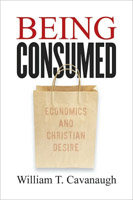By William T. Cavanaugh (Eerdmans, 2008)
Luke tells us in Acts 2 that the earliest Christians formed economic communities shaped by the Eucharist, sharing their resources as they broke bread together. William Cavanaugh’s new work on eucharistic economics argues that contemporary Christians should also form their economic lives in light of our eucharistic faith. Cavanaugh does not suggest we reject the free market but urges us—as members of the Body of Christ—to critique global capitalism’s troubling assumptions and to take concrete steps toward creating just and humane economic communities.
Cavanaugh argues that a truly “free market” is not merely one free of government intervention, for in so-called free market economies throughout the developing world, tens of millions of workers toil for slave-like wages so middle-class Americans can purchase cheap goods. Making these markets genuinely “free” requires that we ensure all parties receive a chance to flourish. This means our vision of a free market must be grounded in a vision of a truly human community, where no one is free until all are free.
Though many believe the problem with consumerism is our attachment to material goods, Cavanaugh warns that the real danger of insatiable consumption is that we become detached shopaholics, cut off from those who make and deliver what we buy. When we consume the Eucharist, however, we are taken into the Body of Christ and connected with all the suffering and laboring bodies of the world. This, Cavanaugh argues, is the model of consumption that should shape and reform our economic practices so that our purchases and investments reflect our attachments to the larger Body of Christ.
According to Cavanaugh, modern economics helps us grow our gross national (or global) product but cannot tell us what sorts of humans or communities we ought to become. To answer these deeper questions we need to turn to our eucharistic faith.















Add comment